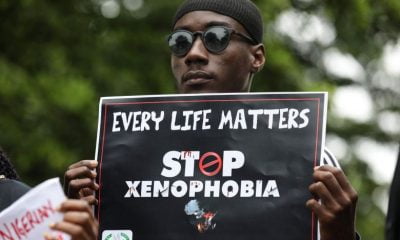Nigeria News
The Relegation of our Local Dialect(s)

“Regret and remorse is a dialectic issue about what has been done, about what should have been done and about what should not have been done”.– Erik Pevernagie, Island of regret. Island of remorse” (Erik Pevernagie)
It is expedient we take a cursory look at what “dialect” entails before establishing how we have lost and sold off our heritage: dressings, eating culture, speaking mode, which this write-up makes its priority to address. The term “dialect” is controversial and different writers, scholars and institutions have given a series of opinions to the subject of the matter. However, there is no generally accepted definition. It is against this backdrop that the following definitions ensued;
Dialect, according to Britannica.com, is a variety of a language that signals where a person comes from. The notion is usually interpreted geographically (regional dialect) or occupation (occupational dialect). English Oxford Dictionary sees dialect as a particular form of a language which is peculiar to a specific region or social group. Merriam Webster dictionary defines it as a regional variety of language distinguished by features of vocabulary, grammar, and pronunciation from other local varieties and constituting together with them a single language. According to Wikipedia, it refers to a variety of a language that is a characteristic of a particular group of the Language’s speakers. Under this definition, the dialects or varieties of a particular language are closely related and, despite their differences, are most often largely mutually intelligible, especially if close to one another on the dialect continuum. This term is usually applied to regional speech patterns, but a dialect may also be defined by other factors– social class or ethnicity. A dialect that is associated with a particular social class can be termed a “sociolect”; one associated with a particular ethnic group can be termed an “ethnolect”; and a geographical/regional dialect may be termed a “regiolect” (alternatives are “regionalect”, “geolect” and “topolect”). A review of the above definitions and for the purpose of this study, “dialect” can be referred to be a set of languages or language that is associated with a particular group of people of related culture.
Having examined the concept “dialect,” narrowing it down to Nigeria, polity and exploring a comparative study with other nations of the world is relevant to this study. Nigeria, a country with over 250 ethnic groups with different dialects. The major tribes are Hausa, Igbo, and Yoruba. This country with a resourceful and beautiful culture is experiencing an extinction of her mother tongues, and that is why the main theme of this write up is built upon dialect. This stormy wind needs urgent attention from all stakeholders in order to avert a situation where foreigners will take the role of indigenes in the land (ceteris paribus).
Gone are those days when our forefathers are not privileged to witness industrial revolution era, the advent of technological advancement and other forms of modernization but they value and preserve their heritage, as a matter of fact, their dialect. These un-civilized set of people as we do call them experienced economy stability during their period; criminal activities were minimal, and the state was peaceful. On the other hand, we, the so-called civilized bigots chase after the white-men in all ramifications (dressing, eating culture, speaking mode, and the likes) to the extent of celebrating nudity, all in the name of embracing civilization. Have all these fetched our development? Have we maintained our mantra as a giant of Africa? Do all these free Nigeria from global insults? Undisputable No!
It bothers me a lot as I wept bitterly within myself, my heart shaken & aches to the point of degenerating into an unwelcomed headache as the thought of enthroning a foreign language and dethroning ours has taken the limelight. I’m not advancing that the speaking of English should be eliminated in our society; instead, our local dialect needs to be promoted and encouraged to be spoken among ourselves. THE DEVELOPMENT WE ARE CLAMOURING FOR CANNOT MATERIALISE IF WE INTEND TO BE A CARBON COPY OF THE WHITE-MEN RATHER, THE DEVELOPMENT LIES WITHIN US.
The unforgettable event that prompted me to write this article is an empowerment programme I was privileged to be a participant. One of the speakers committed a grammatical blunder, and it degenerated into unexpected noises, murmuring and laughing that have a slight label of mimic. This pitiful situation lasted for minutes until the organizers came to clear the rowdy atmosphere by saying; “who amongst us has never committed a grammatical error in the past”? Then, the audience regains their comportment. As the speaker leaves the stage, a thought came to my mind that if the speaker could speak English fluently even more than those who reside in England and he tries to speaks his local dialect as a kinsman of Afenifere. The imagination of a variety of response flow into my skull and the envision of it were in the form of; Wow! Awesome! Fantastic! I love the speaker, his oratory prowess and eloquence is unmatchable, but we are less concern about the local grammatical blunder he made. We would go ahead to appraise him. So much importance has been attached to the Language that if your oration is not fluent or your weakness is inherent in speaking it, such a person would be subjected to an undifferentiated miserable treatment melted out to a basket of displeasing and mangy vegetables. A privilege turns into arrogance! Unfortunately, we have forgotten a Yoruba adage that goes thus; a man who forsake or neglect his origin, such man has sowed a seed of anguish.
Our educational system is not free from this menace, and it’s not helping the situation as it has turned her blind eyes towards promoting our local dialects. We have a scarcity of teachers who can take Yoruba, Hausa, and Igbo in our schools to the saddening state of some schools not having teachers at all. This gives the students a shallow insight to see the subjects as irrelevant and belittle its importance. The gatekeepers of the country have misplaced their priority in the educational system, and they’ve gone to a sleeping mode to the extent of snoring, thinking that things are right, but in which the rights are absolutely wrong and they’re oblivious of the destructive hole at the back locus of the educational ship of the state. This is a time bomb that needs to be defused before it detonates if we truly know the consequences.
A conversation with my younger brother about Yoruba subject at his school clearly attests to the fact that our government also contributes to the irrelevance of these subjects among students of various schools. Why can’t the government make Yoruba, as well as other major languages, a mandatory subject like Civic Education and Animal Husbandry that all students must do throughout their primary and secondary schools days, private schools inclusive to the point of registering for WAEC and a monitoring committee should be put in place to enforce its implementation?
Educationists, Scholars, and other concerned stakeholders have advanced for the teaching of pupils, and in some cases, higher school students in our local dialect and it has been scientifically proven that a child that is taught in his/her mother tongue would grasp quicker. Thus, the level of innovation and assimilation of such child would mount the ladder of increment. An innovative breakthrough at our doorstep but the sight to visualize it is functionless. What a visionless thinker, claiming to have vision but illusory is the visible end product!
Changing our lackadaisical attitude about our local dialects starts from home. There is a crack in the wall of the family institution with respect to awarding of merit to foreign Language and sentencing our local dialect into a lugubrious captive of mediocrity. Instructing and commanding our children not to speak her mother tongue when they get back from school is a sign of disintegration in our dear Heritage wall that needs to be redeemed. Let them speak English as much as they can when they are in school but when they get home, converse with them with their local dialect. Speaking of English fluently doesn’t determine one’s success in life but GOD pilot our success story. Some well-known and handsomely paid footballers cannot communicate in English. They employ the service of an interpreter, and this doesn’t deter them from being successful. In the political world, many notable politicians cannot speak English, and if they do, it is on rare occasions. Vladimir Putin of Russia began the studying of English a few years ago, and he rarely speaks it. Chinese President, Xi Jinping, can only speak a little English and Japanese Prime Minister, Shinzo Abe, uses the service of an interpreter when conversing with an English speaker. English is a stepping stone and not a major determinant of success. This English speaking is a KEY giving to us, in which aftermath, the PADLOCK was changed. That is why, you will see many Nigerians on the street that can speak Queen’s English more than David Cameron, Tony Blair, Prof. Wole Soyinka, Adam smith, Michelle Obama and the likes but are yet to hit the success jackpot and also to record a success story in their empty turning point diary is like an Olumo rock placed on their chest. What a meritocracy debasement!
Asian tigers were able to develop as a result of their culture embracement and also finding local solutions to their problems. China speaks Chinese; Japan speak Japanese, Arabs speak Arabic, Russia speaks their Language and among others. Securing jobs or gaining admission in these countries higher institutions require you to learn their Language before being absorbed into their institutions. Are we more civilized or advanced than these countries? Why are we plagued by this language syndrome? Can’t we imitate them in this aspect?
It’s quite unfortunate that the heritage (local dialects) that we’ve abandoned are being cherished by these whites (foreigners). A tour to the university of Ibadan makes me realize how these white people have embraced our culture. A number of them are studying Yoruba in the institution to the extent of acting plays in Yoruba dialect. Further research made by the writer exposes me to the new development in the United States of America language arena where a program tagged “Foreign Language Teaching Assistant Program” (FLTAP) was launched inviting young foreign teachers who could teach Yoruba or Hausa Language and culture to America students in their universities and colleges. If an alien could do this, I wonder the stand, the OWNER of the tongue would take in the language court. I hope it doesn’t get worse to the point of employing folks to come and teach us our local dialects.
In conclusion, for better for worse, I think the use of English as a medium of instruction in Nigeria schools has come to stay. Nevertheless, I so much believe that there is room for communities to organize seminars and workshops for their members in their local Language. Such a bold step may be necessary if we are to successfully address the advancement gap between us and technologically advanced countries of the world. For so long, we have been talking of catching up; such a thing won’t happen until we start working for homegrown solutions to our problems.
I don’t speak English in casual conversation unless the person I’m addressing doesn’t speak Yoruba. Neither do I think in English. Do you?
Dauda Taoheed is a serving corp member in Abeokuta he can be reached via 08147604494




